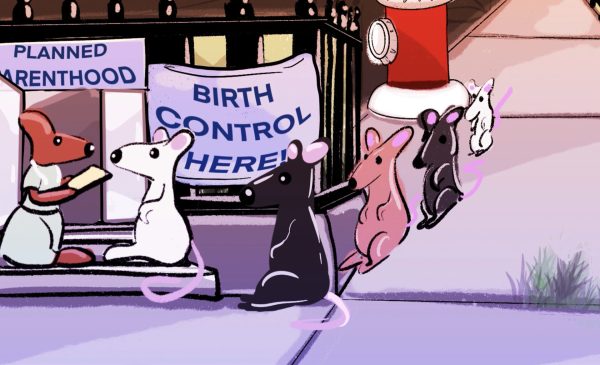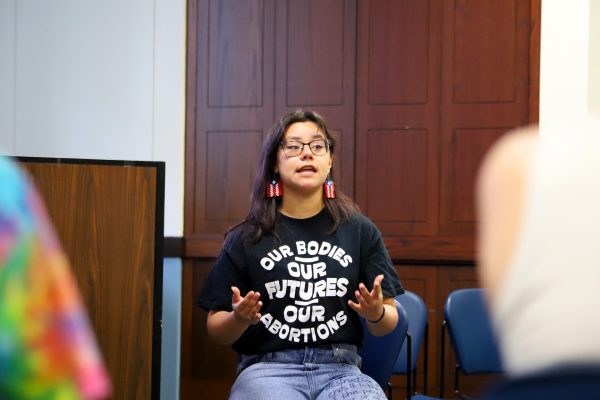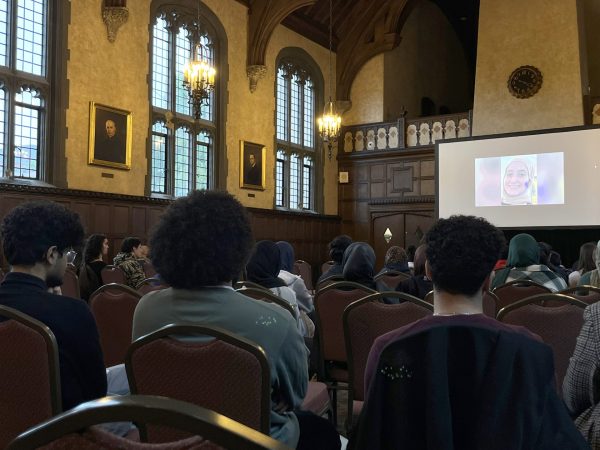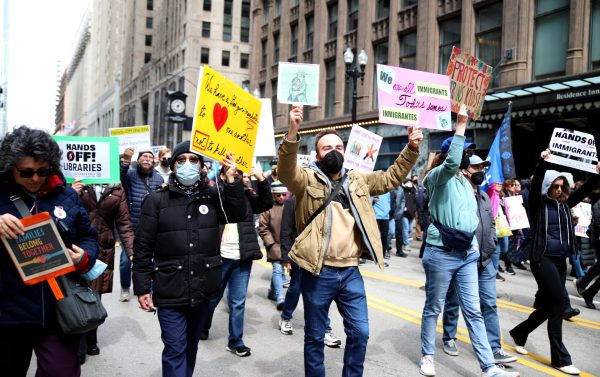Alderman candidate Comer proposes offering DePaul students one year’s tuition if join CPD
Credit: Courtesy of Brian Comer’s Campaign Instagram
Brian Comer, a 43rd aldermanic race runoff candidate, receives a signature from a Lincoln Park resident to get him on the ballot for the 43rd Ward aldermanic race.
Almost three years ago, DePaul students gathered in the Lincoln Park quad to protest the university’s affiliation with Chicago police. Among the students’ demands included DePaul’s immediate divestment from the Chicago Police Department (CPD) and termination of its agreement with the Fraternal Order of Police (FOP) that offered members a 25% discount in tuition at DePaul.
Now, ahead of Tuesday’s upcoming aldermanic runoff election for the 43rd Ward, candidates Timmy Knudsen and Brian Comer are both making public safety the forefront of their campaigns.
A primary facet of Comer’s plan to improve public safety in the 43rd Ward involves addressing the staffing deficit in the police department since the pandemic. To do so, he explained his idea for a pilot program when answering an endorsement questionnaire for the Chicago Tribune, offering DePaul graduates one year’s tuition reimbursement if they join CPD for four years after graduation.
However, some students do not believe DePaul is the ideal university to start a pilot program that encourages students to enter the police force.
DePaul political science student and president of the DePaul College Democrats, Joe Valliquette, said the protests in 2020 to terminate DePaul’s connection with the FOP showed how students feel about CPD.
“There was a huge uprising among students regarding what he wants to build upon, which is the FOP connection between DePaul [and] finding different routes into CPD through the college of law and education,” Valliquette said.
Comer said developing a partnership between the university and CPD to build this pilot program will help address the negative perception surrounding the police and Chicago’s communities.
“This is a way to expose young people to possibly serving in the police department,” Comer told The DePaulia. “It can make the relationship between community and police department richer and more robust, so that there is more understanding about the communities that they serve.”
According to Comer, the police department has been working at a 2,000 person deficit which he believes greatly impacts safety in the city and on the CTA.
“It all starts with public safety. And it’s an acute problem, so we need innovative solutions to address it,” he said.
Megan Alderden, director and associate professor of criminology at DePaul, said this program could encourage more young people to join the police force.
“Especially [in] Chicago [with] the consent decree, and the protests, and that kind of stuff has also created a condition where fewer people are entering policing,” Alderden said. “You would have individuals who are graduating with a four-year degree now much more likely to be interested in potentially joining the police department.”
For Comer, DePaul’s emphasis on the Vincentian mission and service-based work makes it the ideal university to start this pilot program.
However, Valliquette does not think the vast majority of students would be interested in joining the police force.
“I was kind of taken aback by that as a solution to public safety,” he said. “If you think that’s a good policy or program for DePaul, you haven’t been to DePaul’s campus and talked to students in years. It’s such a disconnect from the reality of how students feel about CPD, especially considering we’re a school that doesn’t have a police academy.”
When asked what he plans to do if DePaul students are not interested in the program, Comer said he would work on revising the program to fit students’ needs.
“I’d rather be part of designing something than not designing something,” he said. “I think it’s a great place to actually build a program and, you know, define it.”
After initiating the program at DePaul, Comer plans on expanding it to universities across the city.
When asked how he will fund student’s tuition reimbursement as part of the program, Comer said he will rely on funding from organizations focused on public safety.
“There are so many different organizations, both public and private, that have funds for public safety that we can use our partners at all levels of government,” Comer said.
Alderden said there are benefits to recruiting police officers with a college degree.
“There is stem research that kind of shows that people who get a four-year degree, actually end up doing really well in policing and do better in policing than maybe people who don’t have that background,” she said.
To bridge the gap between Chicago communities and the police department, Alderden said hiring is necessary to employ officers who are focused on serving the city, rather than harming it.
“So we start with hiring people, there is some research that indicates that it’s not so much how many people you have, but it’s really what you do with those individuals,” she said.
Comer also said he wants more officers stationed in the CTA to increase safety measures and ridership.
Like Alderden, he believes if we get more officers who are community-focused and educated on Chicago’s history of segregation and violence, they will be able to influence reform from within CPD.
“It’s just a wonderful opportunity to just get good people in the police department, and to help make the police department better,” Comer said. “You know, we want our police officers to be integrated into communities.”
Valliquette said a better way to tackle the public safety issue is to work with city council to combat crime at the community level through youth outreach programs.
“I’ve never met someone at DePaul that wants to be a police officer,” Valliquette said.
Comer said once the staffing deficit within CPD is resolved, the program will no longer be necessary.











